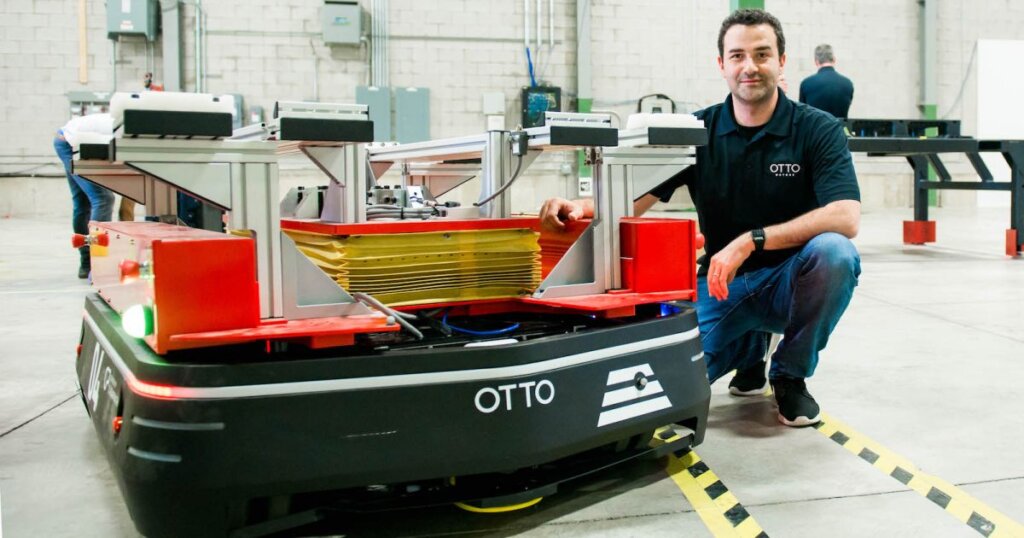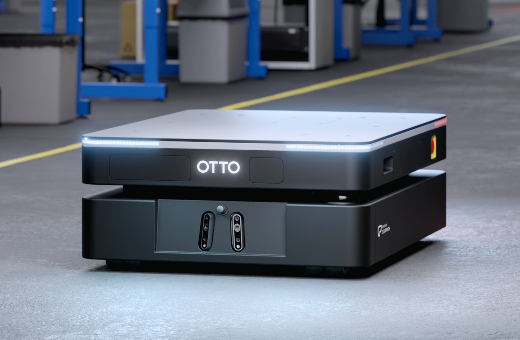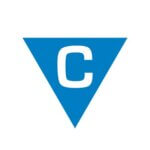Home » Robots to the rescue – Communitech
Robots to the rescue – Communitech

Industrial-robotics maker OTTO Motors is doing the heavy lifting for customers struggling with two global trends.
The first trend is a shortage of manufacturing and warehouse labour. The second is the fragility of global supply chains, which broke down during the pandemic and prompted many companies to pull more of their manufacturing back from overseas.
Throw in OTTO’s experience at building autonomous mobile robots (AMRs) and you’ve got a recipe for success in the post-pandemic era.
“We’ve very squarely proven ourselves as the solution of choice for manufacturers that must turn to automation in the face of near impossible-to-solve labour challenges,” says Matt Rendall, co-founder and CEO of OTTO Motors and its parent company, Clearpath Robotics.
Rendall and his team are celebrating the launch of the OTTO 600, the newest model in the company’s fleet of autonomous vehicles, which move stock, parts and other materials around busy industrial settings.
The OTTO 600 is a mid-range AMR that can maneuver in tight spaces and carry up to 600 kilograms (1,332 pounds)

The OTTO 600 (Photo courtesy OTTO Motors)
The company has also updated its fleet-management software, which allows customers to co-ordinate the movement and activities of multiple OTTO robots operating in the same facility.
“The success of large-scale, deeply integrated deployments depends significantly on effective fleet management,” Jay Judkowitz, VP of Product, said in a news release. “In this software upgrade, we are introducing new traffic management functionality that enables users to create different rules of the road for groups of different OTTO AMRs in the facility, resulting in faster traffic movement and improved safety.”
Rendall described the company’s software as the “crown jewel of our offering.”
“The role of usability and user experience in adoption of new technology is the potential difference between success and failure,” he says. “And so usability is an area that we have been investing deeply in for a very, very long time.”
Clearpath Robotics was founded in 2009 by Rendall and three engineering classmates at the University of Waterloo.
The company name came from the idea of using robots to “clear a path” through minefields, a reflection of the founders’ interest in “tech for good.” (In 2014, Clearpath became the first robotics company to support the Campaign to Stop Killer Robots, an international coalition working to ban fully autonomous weapons.)
The company’s focus has evolved and broadened since its startup days.
Clearpath continues to create robotic platforms for research and for rugged outdoor work. Clients use their customizable autonomous vehicles for a wide range of tasks, from observing emperor penguin colonies in the Antarctic to monitoring construction sites remotely.
In 2015, Clearpath spun out a separate division – OTTO Motors – to pursue a growing market for industrial AMRs.
As Rendall explains, the nature of Clearpath’s focus on robotics for research and customized applications gave the co-founders valuable insights into a wide range of emerging opportunities.
“We got exposure to every single industry and application where autonomous technology was of interest,” he says. “What that did, essentially, was give us a market crystal ball: we were able to use the insights of all the different projects that we were working on to… understand where the puck was going.
“So, in 2013 we started picking up market signals that the rest of the world wouldn’t see for another five or six years. And that’s when we made the decision to leave from our bootstrapped heritage, raise venture capital and then very aggressively pursue the AMR market opportunity and build what is today known as OTTO Motors.”
It’s been a busy and successful 10 years:
- Parent company Clearpath has raised more than CDN$98 million in venture capital through series A, B and C rounds.
- Revenue continues to grow year over year, according to Rendall.
- Seventy per cent of OTTO’s customers are Fortune 500 companies, such as Toyota and GE.
- Clearpath operates from four buildings in Waterloo Region: the Clearpath headquarters in Waterloo, the OTTO Motors headquarters and a manufacturing plant in the south end of Kitchener, and a testing facility in Cambridge.
- Clearpath and OTTO together employ about 360 people and have about 20 openings to fill
“It's pretty incredible growth,” says Rendall. “And we see no sign of slowdown. In fact, we're seeing acceleration.”
Asked about plans for additional venture financing, Rendall says Clearpath is open to considering a series D round but for now “we are well capitalized and we have appropriate cash to execute our vision.
“One of the benefits that we have in being a slightly more established company in the ecosystem is there's more of a financial profit-and-loss foundation underneath us,” he says. “So, we have more ability to tune knobs based on market sentiment, and we are adapting our strategy accordingly.”
Despite the economic tremors that are currently shaking the global tech sector, Rendall has been through enough cycles to know that this too shall pass. In fact, he thinks the COVID-19 pandemic had a few silver linings. One was the spotlight it put on supply chains which, among other things, prompted international customers to consider buying Canadian technology more readily.
“What I'm very excited and optimistic about emerging from the pandemic is where Canadian technology sits on the global stage,” he says. “I think it helped level the playing field for global buyers to consider Canadian technology more than ever before.”
This elevated visibility syncs nicely with Communitech’s efforts to support and promote Canada’s highest-potential tech companies through its Team True North initiative, which includes Clearpath.
“You combine that (pandemic-fueled interest in Canadian products) with some really exciting changes happening at Communitech with its Team True North program and it helps elevate Canadian technology companies in the minds of global buyers.”
Combined with the innovative and well-established ecosystem in Waterloo Region, Rendall thinks the regional tech community will come through the market turbulence stronger than ever.
“I think we're about to enter into a golden era, a really important stage in Kitchener-Waterloo and, more broadly, in southern Ontario,” he says. “I'm thrilled that we're part of it and I'm excited to see what the community is able to produce in this cycle.”
Communitech
https://communitech.ca
"Communitech helps tech-driven companies start, grow and succeed. Communitech was founded in 1997 by a group of entrepreneurs committed to making Waterloo Region a global innovation leader. At the time it was crazy talk, but somehow this community managed to pull it off. Today, Communitech is a public-private innovation hub that supports a community of more than 1400 companies — from startups to scale-ups to large global players. Communitech helps tech companies start, grow and succeed in three distinct ways: - Communitech is a place – the center of gravity for entrepreneurs and innovators. A clubhouse for building cool shit and great companies. - Communitech delivers programs – helping companies at all stages with access to capital, customers and talent. We are here to help them grow and innovate. - Communitech partners in building a world-leading ecosystem – making sure we have all the ingredients (and the brand) to go from a small startup to a global giant."


